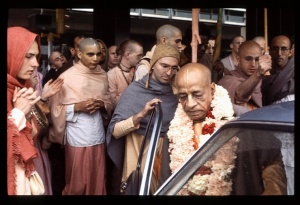SB 6.6.17-18

A.C. Bhaktivedanta Swami Prabhupada
TEXTS 17-18
- sarūpāsūta bhūtasya
- bhāryā rudrāṁś ca koṭiśaḥ
- raivato 'jo bhavo bhīmo
- vāma ugro vṛṣākapiḥ
- ajaikapād ahirbradhno
- bahurūpo mahān iti
- rudrasya pārṣadāś cānye
- ghorāḥ preta-vināyakāḥ
SYNONYMS
sarūpā—Sarūpā; asūta—gave birth; bhūtasya—of Bhūta; bhāryā—the wife; rudrān—Rudras; ca—and; koṭiśaḥ—ten million; raivataḥ—Raivata; ajaḥ—Aja; bhavaḥ—Bhava; bhīmaḥ—Bhīma; vāmaḥ—Vāma; ugraḥ—Ugra; vṛṣākapiḥ—Vṛṣākapi; ajaikapāt—Ajaikapāt; ahirbradhnaḥ—Ahirbradhna; bahurūpaḥ—Bahurūpa; mahān—Mahān; iti—thus; rudrasya—of these Rudras; pārṣadāḥ—their associates; ca—and; anye—other; ghorāḥ—very fearful; preta—ghosts; vināyakāḥ—and hobgoblins.
TRANSLATION
Sarūpā, the wife of Bhūta, gave birth to the ten million Rudras, of whom the eleven principle Rudras were Raivata, Aja, Bhava, Bhīma, Vāma, Ugra, Vṛṣākapi, Ajaikapāt, Ahirbradhna, Bahurūpa and Mahān. Their associates, the ghosts and goblins, who are very fearful, were born of the other wife of Bhūta.
PURPORT
Śrīla Viśvanātha Cakravartī Ṭhākura comments that Bhūta had two wives. One of them, Sarūpā, gave birth to the eleven Rudras, and the other wife gave birth to the associates of the Rudras known as the ghosts and hobgoblins.